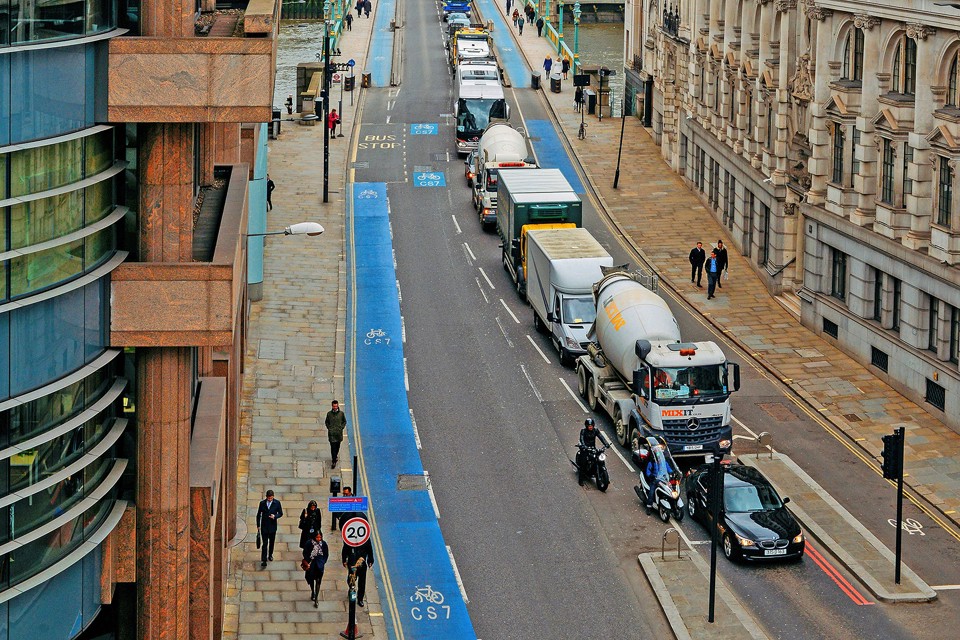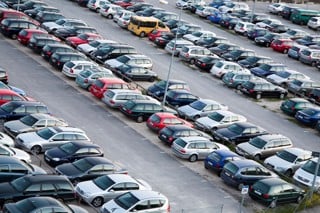New guidance allowing local authorities to widen pavements and re-distribute road space fails to consider the needs of delivery and service fleets.
No mention is made of maintaining kerbside access for deliveries, the needs of other road-users or the potential economic impact.
Published by the Government to help councils manage social distancing as the lockdown is lifted and people return to work, calls are now being made for the official guidance to be amended and re-issued.
Delivery drivers were lauded at the outbreak of the pandemic, for ensuring shelves were kept stocked and vital services maintained.
Designated as key workers, they were labelled the ‘knights of the road’. “We were hailed as being essential and now we’ve been forgotten in these plans,” said Natalie Chapman, head of urban policy at the Freight Transport Association (FTA).
“Air quality is important, safety is important, but we need to strike the right balance to make sure it’s workable for business.”
Both the FTA and the Road Haulage Association (RHA) have written to the Department for Transport (DfT) to request urgent reassurances over the new guidance. The DfT has yet to respond.
Chapman said she was “hopeful” that Government may re-issue guidance to local authorities, with provisions for deliveries.
But, given the daily, high-level contact that the industry is having with ministers at the DfT, she told Commercial Fleet she was “very disappointed” for freight to be “completely overlooked”.
She also fears that more people will choose to drive, rather than walk and cycle, leading to greater congestion in towns and cities, with precious road space being re-distributed.
In a letter to transport minister Baroness Vere, RHA chief executive, Richard Burnett, questioned how much road space was being lost to vans and trucks.
“In London, the place with by far the highest cycling levels of UK cities with more than 200,000 people, just 2.5% of trips are made by bicycle,” he said.
“We appear to be taking space away from the 97.5% of other road users to favour a small minority.”
He insisted that the RHA was not anti-cycling, but it simply believed the road network needs to work for “all road users”.
The RHA is particularly concerned about the removal of parking. Burnett says access to businesses in urban areas is “already difficult” in many places.
The current situation has made problems worse as the need to socially distance, when making deliveries and collections, can extend waiting times.
Burnett said: “We are already seeing enforcement of petty overstay times when making deliveries. Reducing parking for goods vehicles further – the vehicles that are essential for the businesses of people of our cities – is extremely unhelpful.”
Chapman worries that councils “don’t get freight”. She explained: “That’s not necessarily their fault, but that’s where Government needs to step in and provide that clarity.”
As the country moves into the next phase of lifting the lockdown, an increasing number of retail outlets will begin opening their doors.
“They’re going to need deliveries otherwise they’ll have nothing to sell,” continued Chapman. “We need that guidance as soon as possible, because these schemes are coming forward now.”
‘TEMPORARY’ MEASURES
Cities across England have already started adapting road layouts to provide more space for cycling and walking as coronavirus restrictions begin to be lifted.
Some streets are becoming bike- and bus-only, while side streets could be closed to through traffic, to create low-traffic neighbourhoods and reduce rat-running.
Manchester has launched a £5 million Safe Streets Save Lives campaign, with local authorities looking to prioritise a range of temporary, pop-up measures such as pavement widening, one-way streets, removing through traffic on certain roads and adding extra cycle lanes.
In the capital, Transport for London (TfL) has launched the ‘London Streetspace’ programme, which aims to “rapidly transform” roads to accommodate a possible 10-fold increase in cycling and five-fold increase in walking.
Euston Road is one of the first main thoroughfares to have temporary cycle lanes installed and Park Lane could follow suit.
Meanwhile, streets between London Bridge and Shoreditch, Euston and Waterloo, and Old Street and Holborn, could be reserved for buses, pedestrians and cyclists.
All these measures can be introduced temporarily, either in isolation or as a combined package. Some interventions, including new lightly segregated cycle lanes, will not require Traffic Regulation Orders (TROs); others will.
They are classed as ‘permanent’, ‘experimental’ and ‘temporary’, with councils opting for temporary TROs to introduce the majority of measures.
‘LIMITED’ CONSULTATION
Temporary TROs can be in place for up to 18 months. There is a seven-day notice period prior to making the TRO and a 14-day notification requirement after it is made, plus publicity requirements.
Local authorities say that –following consultation with communities – they would like to make many of the schemes permanent.
However, in the interim, the use of temporary TROs is only giving businesses and fleet operators seven days to respond. Chapman says, with the volume of traffic orders being issued, the industry simply doesn’t have the ‘bandwidth’ to look at all of them in detail.
She added: “It would save a lot of time and hassle if they were better thought out from the outset with good quality guidance, which would enable them to develop much better schemes.”
TfL acknowledged that, due to the speed at which these temporary changes need to be introduced, it would not be able to formally consult before changes are made.
However, a spokesperson told Commercial Fleet, TfL was working with local businesses and boroughs to “ensure the temporary arrangements accommodate their requirements”.
It will also review all changes regularly to ensure they are operating as intended.
The spokesperson said: “Freight is the lifeblood of London’s economy and TfL is committed to working together with the industry to tackle some of its biggest challenges, including road danger and air quality.
“As part of these plans we are still protecting key freight corridors to maintain essential deliveries and servicing, and all projects will go through a robust approval process.
“This includes making sure that there are alternative routes available and seeking to ensure that provision for loading continues, though there may be changes to when servicing can take place.”
The spokesperson added that TfL continues to have regular discussions with freight companies and industry trade bodies around the impact and operation of these and other changes related to the coronavirus pandemic.
She added: “We work with industry partners in bodies including FORS, LoCity and the Central London Freight Quality Partnership to develop solutions that work and will be re-launching the TfL Freight Forum this summer.”
RESTRICTED ACCESS
Nevertheless, both the FTA and RHA say local businesses must be consulted on all measures, even though their shopfronts may be closed, so they can make sure proposals meet their needs when they re-open.
Kerbside access must also be maintained for deliveries and servicing, while roads should only be closed where the impact is minimal to traffic flows, they say.
Furthermore, they are calling for enforcement against delivery vehicles to be proportionate, while any temporary reallocation of road space should be flexed to reflect changes in demand and to ensure access for logistics.
They also want restrictions on delivery hours to be reviewed.
Restrictions, previously in place on night-time deliveries to stores, were relaxed on March 9 to enable shops to replenish shelves with groceries, hygiene products and other essentials.
As supply chains unravelled, the Government also relaxed competition laws to allow supermarkets to share staff, stock and delivery vans in local areas, to help keep stores open and deliveries on track.
ParcelHero’s head of consumer research, David Jinks, said: “When TfL’s ‘Quiet Deliveries’ scheme was pioneered for the London Olympics the trial was highly successful, with virtually no complaints from residents about noise or inconvenience.
“Sadly, as soon as the Games ended, businesses reverted to their former practices and much of the advances made, in terms of both night restocking and retailer collaboration, were lost.
“This time, as the lockdown lifts, we must not let that happen again.”























Login to comment
Comments
No comments have been made yet.